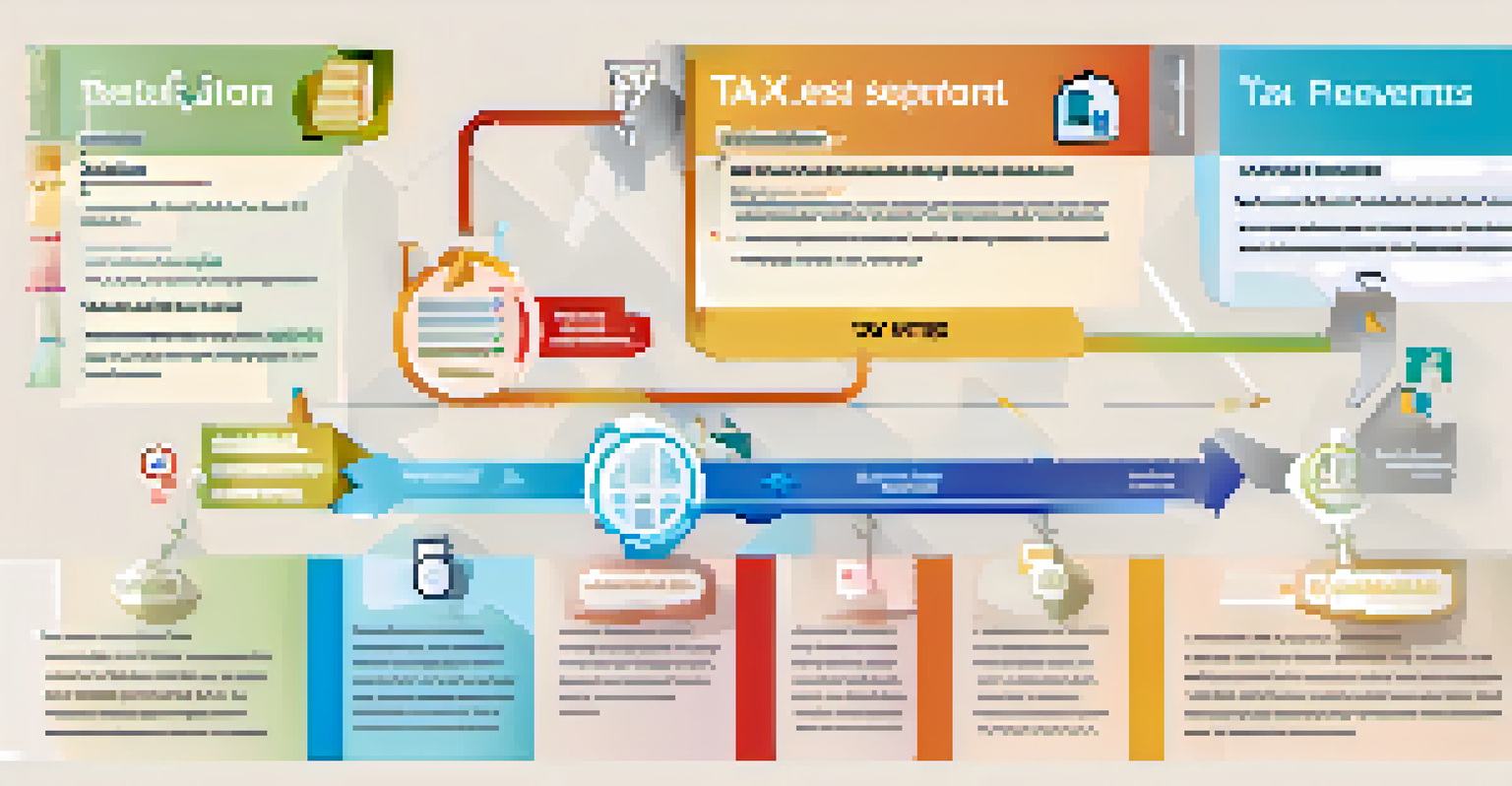Common Tax Disputes: Causes and How to Address Them

Understanding Tax Disputes: What Are They?
Tax disputes arise when taxpayers and tax authorities disagree on tax obligations. These disagreements can stem from various issues, such as incorrect filings or differing interpretations of tax laws. Understanding what constitutes a tax dispute is essential for both individuals and businesses to navigate their financial responsibilities effectively.
In this world, nothing can be said to be certain, except death and taxes.
Common examples include disputes over deductions, credits, and income classifications. For instance, a business might claim a deduction for an expense that the IRS deems non-deductible. Such misunderstandings can lead to audits or legal challenges, making it crucial for taxpayers to be well-informed.
Overall, recognizing the nature of tax disputes helps taxpayers take proactive steps to ensure compliance and reduce the risk of conflicts with tax authorities.
Common Causes of Tax Disputes: A Closer Look
One of the most frequent causes of tax disputes is misunderstanding tax laws and regulations. Tax codes can be complex, making it easy for individuals and businesses to misinterpret their obligations. For instance, frequent changes in tax laws can catch taxpayers off guard, leading to unintentional errors in filings.

Another common issue is discrepancies in reported income. If a taxpayer reports a different income amount than what the IRS has on record, it can trigger an investigation. This often happens due to mistakes in bookkeeping or failing to report all sources of income.
Understanding Tax Disputes
Tax disputes occur when there are disagreements between taxpayers and tax authorities regarding tax obligations, often due to misunderstandings or errors.
Lastly, aggressive tax strategies may also lead to disputes. While it’s legal to minimize tax liabilities, some strategies may cross into gray areas, inviting scrutiny from tax authorities. Understanding these causes can help taxpayers avoid pitfalls.
Filing Errors: A Leading Cause of Disputes
Filing errors are one of the most common triggers for tax disputes. Mistakes in calculations, incorrect personal information, or misplaced documents can lead to significant issues with the IRS. For instance, a simple transposition error in reporting income can result in an audit.
The hardest thing in the world to understand is the income tax.
Moreover, filing late or missing deadlines can exacerbate these errors. Taxpayers might rush their filings at the last minute, increasing the likelihood of mistakes. It's essential to take the time to review tax documents carefully before submission to avoid these situations.
To mitigate the risk of filing errors, many taxpayers benefit from consulting with tax professionals. These experts can provide guidance on proper filing practices and help ensure accuracy in tax submissions.
Disagreements Over Deductions and Credits
Discrepancies over deductions and credits are another major source of tax disputes. Taxpayers may believe they qualify for certain deductions or credits, only to find the IRS disagrees. For example, claiming home office deductions can lead to disputes if the requirements aren’t met.
The subjective nature of some deductions can also lead to different interpretations. What one taxpayer considers a necessary business expense, the IRS may view as extravagant. This type of disagreement highlights the importance of understanding the specific tax rules that apply to various deductions.
Common Causes of Disputes
Misunderstanding tax laws, discrepancies in reported income, and aggressive tax strategies are frequent triggers of tax disputes.
To address these disputes, keeping detailed records and documentation is crucial. Supporting evidence can strengthen a taxpayer's position and help resolve misunderstandings with tax authorities.
Income Classification Disputes: What You Need to Know
Income classification disputes often arise when taxpayers and the IRS disagree on how to categorize certain income. For instance, freelance income may be reported differently than regular wages, leading to confusion. Misclassifying income can result in higher taxes or penalties.
Additionally, the rise of gig economy jobs has introduced new complexities in income reporting. Many gig workers may not receive traditional tax forms, making it challenging to report their earnings accurately. This can lead to disputes if the IRS has a different understanding of what was earned.
To prevent these disputes, it’s essential for taxpayers to maintain accurate records of all income sources. Using software or hiring professionals can help ensure that income is classified correctly and reported in line with IRS requirements.
Audit Triggers: Understanding What to Avoid
Certain actions can trigger an audit, leading to potential tax disputes. For example, large, unexplained deductions or income inconsistencies can raise red flags for tax authorities. Being aware of what might trigger an audit can help taxpayers avoid unnecessary scrutiny.
Additionally, high-risk industries or unusually high profits can attract attention from the IRS. If a business operates in a sector known for tax evasion, it may face more frequent audits. Understanding these risks can help taxpayers prepare and maintain compliance.
Preventing Tax Disputes
Staying informed about tax laws, maintaining organized records, and consulting with tax professionals can significantly reduce the risk of future disputes.
To minimize audit risks, taxpayers should maintain thorough records and ensure their filings are accurate. Consulting with tax professionals can provide insights into best practices for avoiding audits and disputes.
How to Address Tax Disputes Effectively
When faced with a tax dispute, the first step is to communicate with the IRS. Many disputes can be resolved through open dialogue and clarification of misunderstandings. Taxpayers should respond promptly to IRS inquiries and provide any requested documentation.
In cases where disputes escalate, seeking professional help can be beneficial. Tax attorneys or certified public accountants (CPAs) can offer expert advice and represent taxpayers in negotiations with tax authorities. Their experience can make a significant difference in the outcome.

Lastly, taxpayers should keep detailed records of all communications and documents related to the dispute. This documentation can serve as a valuable resource if the situation requires further escalation or legal action.
Preventing Future Tax Disputes: Best Practices
To prevent future tax disputes, taxpayers should stay informed about tax laws and changes. Regularly reviewing IRS guidelines and updates can help individuals and businesses remain compliant. Education is key in understanding one's tax obligations.
Implementing organized record-keeping practices can also minimize errors. Using digital tools or accounting software simplifies tracking income and expenses, making it easier to prepare accurate tax returns. Good organization can significantly reduce the likelihood of disputes.
Finally, consider consulting with a tax professional annually. A knowledgeable advisor can provide insights tailored to individual or business needs, helping to navigate the complexities of tax obligations and avoid disputes.